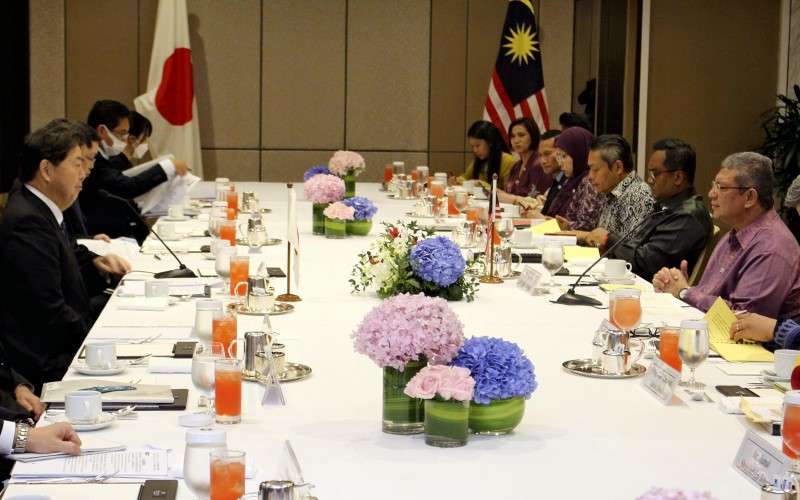WORLD | Foreign minister’s visits underline Japan’s focus on ASEAN

Foreign Minister Yoshimasa Hayashi, left, and Malaysian Foreign Minister Saifuddin Abdullah, right, are seen before a meeting in Kuala Lumpur on Sunday.
13:48 JST, October 11, 2022
KUALA LUMPUR — Foreign Minister Yoshimasa Hayashi has concluded his visits to major countries of the Association of Southeast Asian Nations with a meeting with Malaysian Foreign Minister Saifuddin Abdullah in Kuala Lumpur on Sunday.
Hayashi and Prime Minister Fumio Kishida had been visiting ASEAN nations to demonstrate Japan’s focus on the region ahead of the “50th Year of ASEAN-Japan Friendship and Cooperation” next year.
At Sunday’s meeting, the two foreign ministers confirmed that their countries would strengthen cooperation in a wide range of areas, including security and economy.
“Cooperation with ASEAN is vital for maintaining and strengthening the international order,” Hayashi said to reporter at a hotel in Kuala Lumpur after the meeting. “We want to steadily develop bilateral relations and address various issues facing the international community,” he stressed. Hayashi also visited Singapore during his travels.
Hayashi and Kishida have separately visited seven out of 10 ASEAN countries since March. They went to six countries that are considered to be key members due to their economic strength and other factors — Singapore, Malaysia, Thailand, the Philippines, Vietnam and Indonesia — and to Cambodia, which is currently the ASEAN chair.
Japan-ASEAN cooperation started in 1973 with a ministerial meeting to discuss the issue of Japanese synthetic rubber exports putting pressure on ASEAN’s natural rubber exports. Next year will mark the 50th year since this meeting.
In 1977, then Prime Minister Takeo Fukuda announced the Fukuda Doctrine in the Philippines. The doctrine consists of three principles, including Japan’s stance to consolidate the relationship of mutual confidence and trust based on “heart-to-heart” understanding with the countries of Southeast Asia, which deepened cooperation between the two sides.
Since then, Japan has been building a trust-based relationship by respecting each country’s position without forcing ASEAN nations to lean toward the Western camp even when providing assistance, according to a government official.
ASEAN nations want to distance themselves from the battle for power between the United States and China, and their expectations are high regarding Japan, which does not force them to take sides.
During the foreign ministers’ meeting between Japan and Singapore on Saturday, the ministers agreed to strengthen security cooperation, including the early conclusion of a defense equipment and technology transfer agreement that will allow Japan to export defense equipment.
Japan plans to hold a special ASEAN-Japan summit next year. A senior Foreign Ministry official said: “Each country has a different sense of distance from the United States and China, but there is shared trust toward Japan. Japan can play a major role in preventing China’s unilateral penetration [into the region].”




